Obituary: Nicholas Winton
- Published
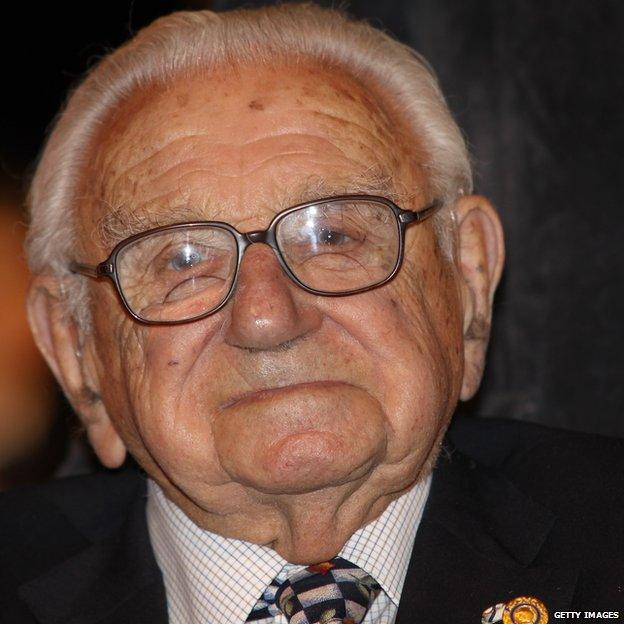
Sir Nicholas Winton, who has died aged 106, has been hailed as a hero of the Holocaust.
During the first nine months of 1938, he oversaw the Czech Kindertransport, which brought Jewish children from German-occupied Czechoslovakia to safety in the UK.
He worked tirelessly to ensure money was raised and homes were found for the young refugees.
Yet, amazingly, his self-effacing manner meant that it was 50 years before the full story of his heroic efforts became public knowledge.
Nicholas George Winton was born on 19 May 1909 in the well-heeled Hampstead district of north London.
His Jewish parents had moved from Germany to London in 1907 and changed the family name from Wertheim to Winton.
They had also converted to Christianity and it was into that faith that their son was baptised.
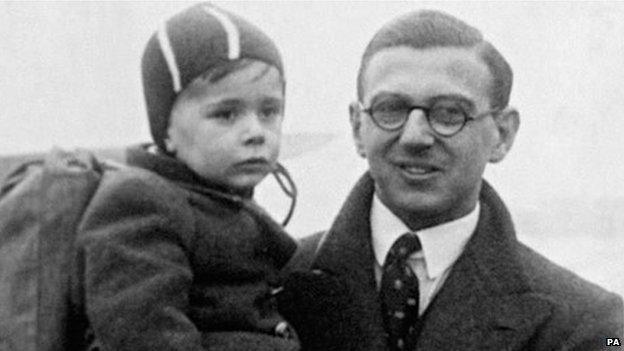
Winton carrying a refugee child in 1939
In 1923, Winton became one of the first pupils at the newly opened Stowe School in Buckinghamshire. Although he left without attaining any qualifications, he had become imbued with a love of mathematics.
He continued his studies at evening classes before moving to Germany, where he worked in banks in Hamburg and Berlin.
In 1931, just two years before Hitler became German chancellor, he moved to work in Paris before returning to London.
His mother's family had remained in Germany and that, together with the stories of Jewish refugees fleeing to London, made him all too aware of the persecution of the Jews by the Nazis.
Besieged
In December 1938, Winton had been due to go on a skiing holiday to Switzerland when he suddenly decided to travel instead to Prague, where a friend was trying to help Jewish refugees.
He visited camps for refugees from the Sudetenland, a German-speaking area of Czechoslovakia, which had been ceded to Germany in September 1938 following pressure on the Czech government from Britain and France.
British activists were already working in Czechoslovakia trying to help the refugees, but Winton's great idea was to rescue children by finding families in the UK to give them a home.
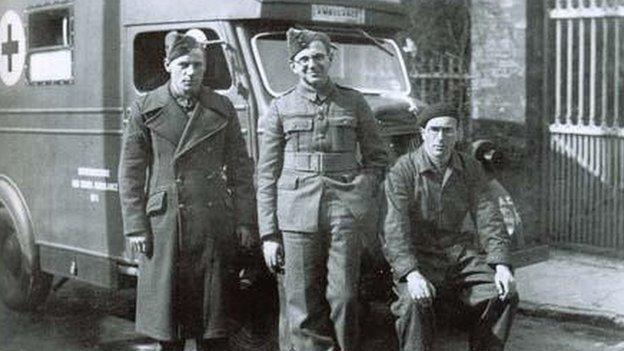
As a conscientious objector, Winton (c) drove an ambulance during the war
He was helped by a 1938 Act of Parliament that permitted the entry of refugee children under the age of 17, as long as money was deposited to pay for their eventual return home.
Winton set up an office in a hotel in Prague, where he was quickly besieged by families desperate to get their children out before Germany invaded Czechoslovakia.
On his return to London, he worked with relief organisations to set up the Czech Kindertransport, just one of a number of initiatives attempting to rescue Jewish children from Germany and the Nazi-occupied territories.
Winton placed dozens of newspaper advertisements pleading for people to come forward and offer children a home. It was not always easy.
Disappeared
"The problem was getting the people who would accept the children, and of course this was at a time when the evacuation of children from the south [of England] was taking place anyway," he said.
"It's marvellous that so many people did come forward. The unfortunate thing was that no other country would come along and help.
"I tried America but they didn't take any. It would have made a vast difference if they had."
In the first eight months of 1939, eight trains left Prague taking 669 children to safety. A further 15 were flown out via Sweden.
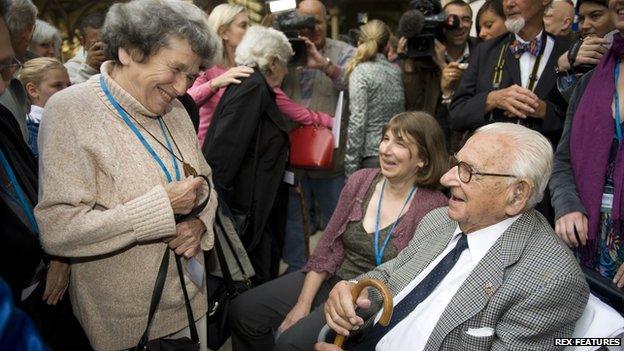
Winton was reunited with many of those he took to safety
The ninth train was scheduled to leave Prague on 1 September 1939, the day Germany invaded Poland and triggered the outbreak of World War Two.
"Within hours of the announcement, the train disappeared," Winton later recalled. "None of the 250 children on board was seen again.
"We had families waiting at Liverpool Street that day in vain. If the train had been a day earlier, it would have come through."
Winton registered as a conscientious objector and served for a time as an ambulance driver, before joining the RAF where he was eventually commissioned.
Re-united
He told no-one about his pre-war exploits and it was not until 1988 that his wife discovered a scrapbook in the attic containing a mass of documents, including the names of the rescued children.
In July of that year, Winton appeared on an edition of the BBC programme That's Life, and some of the people he had rescued were invited to attend.
Until they arrived in the studio, they had no idea that Winton was the man who had saved them.
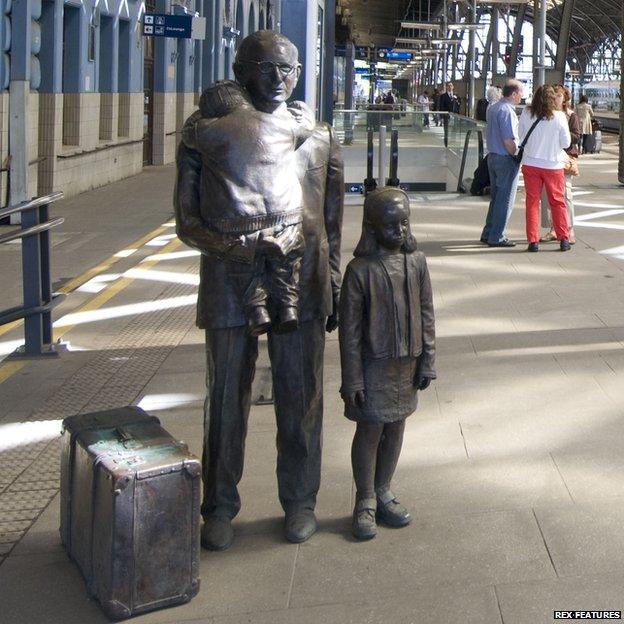
Winton's efforts are commemorated by this statue on Prague railway station
Winton was awarded an MBE in 1983 for his work in establishing the Abbeyfield care homes and, in 2003, was knighted in recognition of his efforts on the Kindertransport.
In 2007, he received the Czech Republic's highest military decoration, the Cross of the 1st Class, and was nominated by the Czech government for the 2008 Nobel Peace Prize.
A train dubbed "The Winton Train" left Prague station on 1 September 2009, exactly 70 years after the last Kindertransport had been due to depart from the Czech capital.
In October 2014, at the age of 105, he travelled to Prague to receive the Czech Republic's highest honour, the Order of the White Lion.
'Darkness everywhere'
In his acceptance speech, he was typically modest: "In a way, I shouldn't have lived so long to give everyone the opportunity to exaggerate things the way they are doing today."
It was another Nobel Peace Prize recipient, Holocaust survivor Elie Wiesel, who summed up the vital role of those who, like Winton, tried to save Europe's Jewish children from the Nazis:
"In those times there was darkness everywhere. In Heaven and on Earth, all the gates of compassion seemed to have been closed.
"The killer killed and the Jews died and the outside world adopted an attitude either of complicity or of indifference. Only a few had the courage to care."